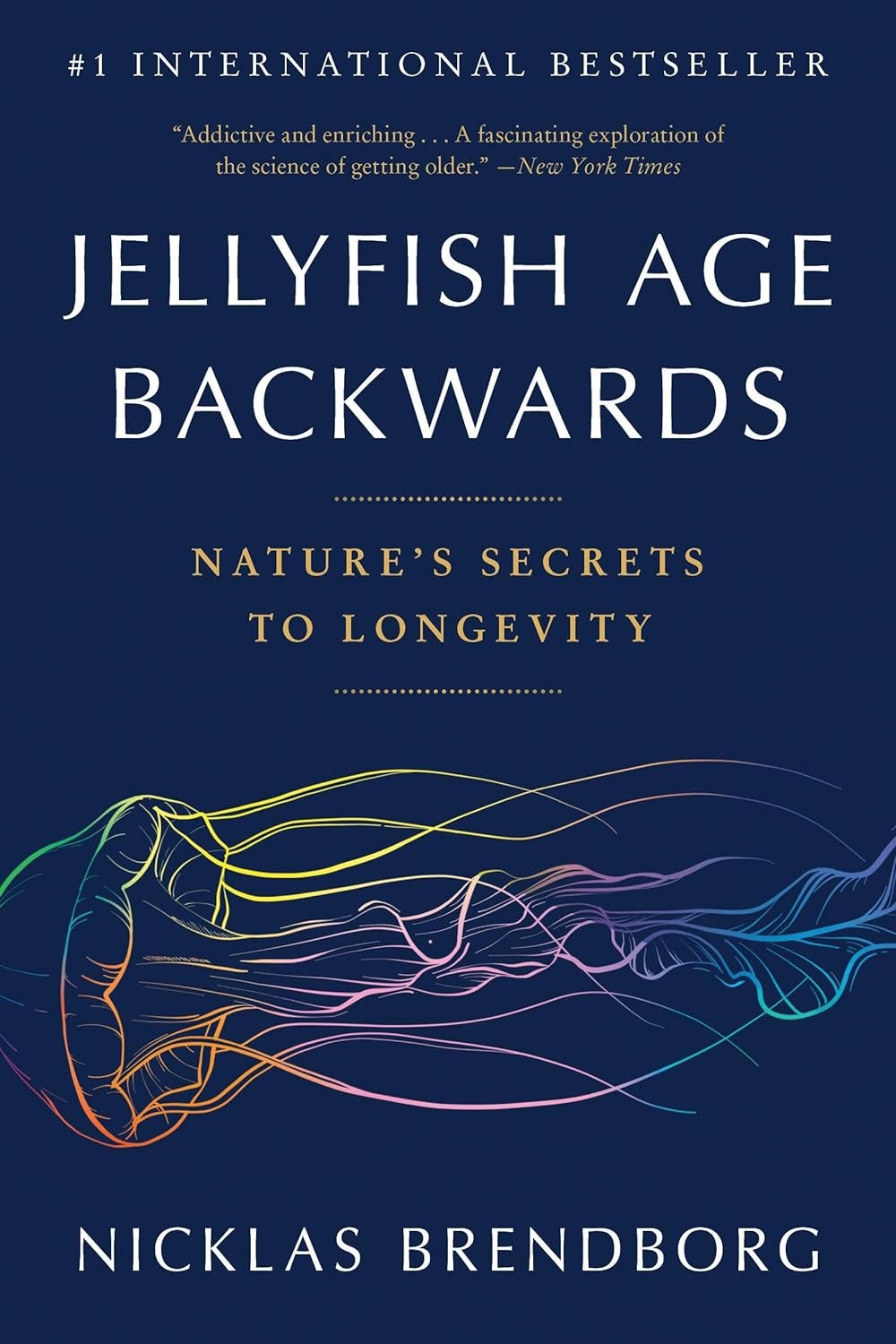Science and biology are where kids who want never to lose the sense of jaw-dropping wonder should point themselves. That seems to be who Nicklas Brendborg is, and his bestseller on aging, Jellyfish Age Backwards, now in paperback, is full of moments of awe, wonder, and mystery.
Aging is one of those eternal quandaries that we find in history and mythology all over the world. Brendborg begins with reference to the Ponce de Leon’s Fountain of Youth:
Alright, serious historians will probably tell you that the Fountain of Youth story is mostly a myth. Fortunately, I’m not a serious historian, so I’m allowed to start my book with a bit of a tall tale.
This is your first clue that Brendborg isn’t writing a Seriously Dry Scientific Treatise stuffed with incomprehensible jargon. The terms and concepts are here – hormesis is an important one – but he seems more interested in explaining and sharing than impressing or befuddling.
He starts with the philosophical – why do we, along with everything else, age, anyway? – and then follows the current research down every rabbit hole that looks intriguing. His bibliography is full of academic papers with titles like “Low serum insulin in traditional Pacific islanders” and “Learning one’s genetic risk changes physiology independent of actual genetic risk.” This is a bestseller because the author excels at translating the academic into mostly everyday language.
If what you are looking for in a book on aging is cutting to the chase, the Do’s and Don’t’s, there is some of that here; Brendborg knows that those reading a book on aging may be seeing it as a personal problem to be solved, and looking for solutions. But he’s more interested, it seems, in the wonder of the quest:
How and why DO jellyfish age backwards or revert to adolescent form?
Why do some human populations, in so-called Blue Zones, live longer and healthier lives?
Why do octopuses die shortly after their eggs hatch – unless their optic glands are removed, in which case they live longer?
Why does arsenic kill worms in a lab – unless administered in low doses, in which case the worms live longer, and also develop resistance to other maladies?
Why do people who take antioxidant supplements die earlier?
Why do larger animals tend to live longer than smaller ones, but smaller individuals within a species tend to live longer?
Why do some of our cells and tissues age faster than others?
Everyone knows stress kills. But everyone also knows stress makes you stronger . . . if it’s the right stress, for the right duration, for your particular condition. Hormesis is the word for “what doesn't kill us make us stronger." Get whooping cough, for example, and you will have improved immunity to it, assuming you survive. (Getting the vaccination is easier and safer. Trust me on this.) Trees are often damaged or killed by wind – but wind also makes them resilient.
One of Brendborg’s frequent refrains is, “It’s more complicated.” Boy, howdy. Just consider what we already know (or think we do): each individual is an entire constellation of living beings when you consider the biome in our guts, on our skin, and even those with whom we relate as other individuals. (Good relationships are good for longevity.) Also, different people respond favorably or not to the same thing: some of us love milk, and some are lactose intolerant; women respond to medicines differently than men do; some of us are prone to certain diseases, like sickle cell anemia or Laron Syndrome.
One reason why Brendborg is reluctant to give anti-aging advice is because he knows how many wrong turns research has taken, resulting in everyone believing what wasn’t true. Ulcers are not caused by stress, after all. Even the medical community refused to believe that for decades after it was demonstrated that ulcers are bacterial in origin. The medical establishment even pushed back when told that it might be a bad idea to go straight from work on cadavers to helping women deliver babies.
Beware of people with something to sell you, whose whole pitch is that scientists have been wrong before. It’s true, we know more now than we did before. But if scientific or medical experts are sometimes wrong, it doesn’t follow that non-experts are right. Trust the ones with a sense of wonder, humility, and openness, not the ones with something to sell. In this context, you will LOVE the stories about “Cargo Cults.” The scientific community is skeptical by design: even the theory of relativity is still constantly challenged to uncover more or better info by discovering missing details.
Meanwhile . . . Eat garlic, wheatgerm, soy beans, and sunflower seeds. Indulge in saunas and winter swimming, preferably together. Exercise after eating. Exercise as much as you tell people you do (we tend to exaggerate). Calorie control and fasting seem to be beneficial. Live at a high elevation. “Good” gut bacteria love dietary fiber. Get your vaccinations, including the first cancer vaccine, for HPV. Give blood. Be skeptical of claims that sound too good to be true. Avoid highly processed foods. And have good friends and relationships of all kind. Mostly, stay curious: it’s an insanely marvelous world, with tons of surprises.
Live long and prosper, friends. But what Marcus Aurelius said is still true: you will die. But you knew that. Cheers!




